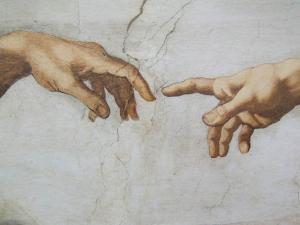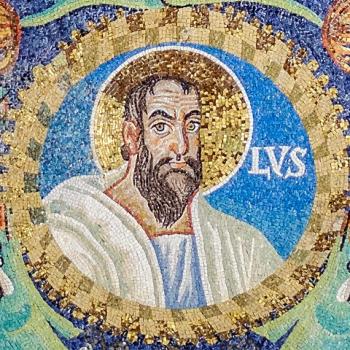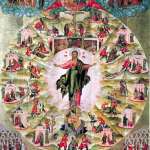
We are created beings, which means, we have a beginning and possibly, an end. We have limits to our being. We seek eternal life, infinite existence, but, it is beyond our potential. Does that mean eternal life is impossible for us? No. We might not be able to possess it, to attain it through the potential we have been given at the time of our creation, but we can be possessed by it, that is, have it flow in and through us, and so find ourselves participating in eternity. It is something which Christ’s resurrection from the dead says will be had by all of us. God constantly offers us the grace to transcend ourselves as we find ourselves in a given instance of our being, to grow and become greater, transcending our natural potentiality throughout eternity. To do so, we must open ourselves up to God’s grace; we must detach ourselves from the state we find ourselves in at a given instance, or in the past, in order to let our potential grow. If, on the other hand, we focus inward, resist self-transcendence through such self-attachment, we will not grow, and without such growth, we will find ourselves becoming stretched thin as we will find ourselves taken in by eternity, that is, resurrected from the dead, and given eternal life, but now in a state of stasis, instead of growth. Eternal life will, in such a state, feel like a curse, that is, hell. This is why hell is said to be a state of being. Thus, it can be said, our greatest potentiality is not found in what we are given in creation, or in any one instance of our existence, but what lies beyond ourselves; that is, it is found in and through the grace given to us by the gracious love of God, a love which allows us a chance to participate in and experience the divine life:
This is the enormous paradox of man. His ontological structure is finite, but his ultimate goal is infinite; the actual potentiality of his energy is limited, but not the final desire that directs this energy. The only possible perfection of man is in the immediate union with the infinite, and he cannot arrive at the infinite. [1]
The more we open ourselves to God, the more we will be enlightened by God’s grace, coming to know and understand the meaning of creation, understanding the value of all created beings. The more we look beyond ourselves, detach ourselves from ourselves, the more we will open ourselves up to God’s infinite grace; we will see it flows, not just outside of ourselves, but within, showing there is both a transcendent and an immanent aspect to God’s grace. The rays of truth found in all religious traditions come from this grace, as those who seek after God find God’s grace enlightens them in some fashion, allowing them to apprehend some element of the truth, an element which they can then share with others. Indeed, it can be said that the way the infinite grace of God interacts with us, enlightening us in various ways, is what draws us to religion and the truths which religion can show to us:
The quest after the infinite alone provides meaning for the finite world in which man finds himself on earth. The imprint of that perfection which man bears within himself makes any finite existence bearable for many only provided it can lead him to the Infinite and the Absolute. Hence the perennity of the mystical quest and the striving of man throughout the ages to see beyond the finite the Infinite Reality which determines and encompasses all things.[2]
The more we open ourselves to the transcendent absolute, to God, the more we will discover the imprint of the transcendent in us. The more we find that imprint in us, the more we can open ourselves up to it, allowing it to change us, so that through it we can become more and more like God. To be sure, we will never become what God is, that is, our nature will always be other than what God is, but through grace, we will be able to participate in God’s being (the divine life) and become, as it were, gods by grace, infinite (but limited) beings, whose meaning and value are realized in and through our relationship with and openness to the immanent-transcendent infinity. The more we see how God uses grace to help us become greater, the more we will discern that God made us so that it would be possible for us to grow in such a fashion, which is why it can be said to be the goal of our existence. That is, all finite being comes from and so exists and participates in the infinity of God, because its being comes from God, so that, as S.L. Frank explained, every finite being finds itself existing in God’s infinity, so that, in their existence, they show that they are made to be able to grow, to become something greater than it is in itself:
This leads to a simple and self-evident proposition, but one that is rarely distinctly remarked: The infinite is always present in the makeup of “experience” (in the broad sense of the word), and the finite is given only on the background of the infinite. Everything that is explicitly given, logically and distinctly fixed, is finite if only because, as “this one” or “this kind,” it has a boundary that separates it from other things. Or, more precisely, it is constituted by this boundary. But it is always a part of something other. And this “other,” either given dimly and indistinctly or not “given” at all but present precisely as the unknown, is infinite. [3]
All things are created interdependent, not only with each other, but with God. The more we try to overcome such interdependence with absolute independence, the more we cut ourselves off from what lies outside of us, leading us to deny the infinite grace we need for eternity to be a blessing. Due to our interdependence with others, it is important that we look after and protect the good of others, because their good affects our own good; denying them the good they need will ultimately lead us to denying what we need for our own good. The more we try to cut ourselves from all other beings, the more we cut ourselves off from self-transcendence, and so from God and God’s grace. This is why salvation, though it has a personal element, must be understood as having a communal quality to it as well. As long as we try to turn our subjective, relative personal existence into an independent existence from all other things, we will find ourselves experiencing the pains of hell. If and when we open ourselves up to self-transcendence, looking for the good, not just for ourselves, but for all things, we will find ourselves experiencing the glory of heaven, the glory which requires us to overcome all selfishness and join together with all things, and with God, by the way of love.
[1] Juan Alfar SJ, “Person and Grace” in Man Before God: Toward A Theology of Man. Ed. Dennis Burkhard OFM, Leo A. Connolly, William T. Merten, and Michael G. Steinhauser (New York: P.J. Kenedy & Sons, 1966), 175.
[2] Seyyed Hosein Nasr, Sufi Essays (Albany, NY: State University of New York Press, 1972), 28 [Sufism and the Perennity of the Mystical Quest].
[3] S. L. Frank, The Unknowable: An Ontological Introduction To The Philosophy of Religion. Trans. Boris Jakim (Brooklyn, NY: Angelico Press, 2020), 10.
Stay in touch! Like A Little Bit of Nothing on Facebook.
If you liked what you read, please consider sharing it with your friends and family!
N.B.: While I read comments to moderate them, I rarely respond to them. If I don’t respond to your comment directly, don’t assume I am unthankful for it. I appreciate it. But I want readers to feel free to ask questions, and hopefully, dialogue with each other. I have shared what I wanted to say, though some responses will get a brief reply by me, or, if I find it interesting and something I can engage fully, as the foundation for another post. I have had many posts inspired or improved upon thanks to my readers.

















